UC Berkeley has a poor reputation among Black students. It’s trying to change that
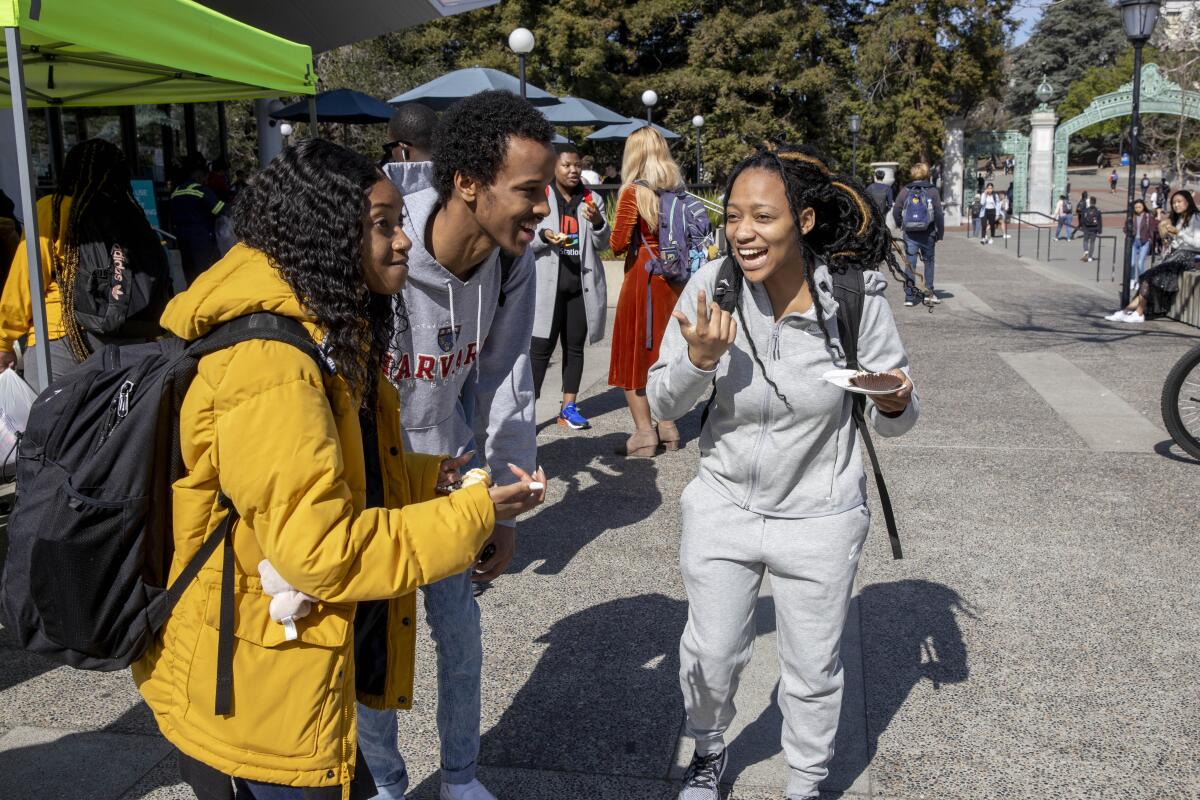
- Share via
BERKELEY — Two years ago, UC Berkeley seemed like a dream campus for Ahmad Mahmuod.
The San Diego-born son of Somali refugees, the first in his family of nine to attend a four-year university, could hardly believe he’d earned admission to the world-famous campus, known for its top academic rankings and history of progressive activism.
But he quickly learned that Berkeley had another, dubious reputation: It’s known for having the worst campus climate for Black students in the University of California system.
On his big move-in day in August 2018, Mahmuod said, no one would get into the residence hall elevator with him even though it was empty. On his first day of classes, he encountered only one other Black student among some 800 peers in three courses — statistics, Arabic, oceanography — and all of his professors were white. That fall, only 3.4% of Berkeley’s nearly 31,000 students were Black.
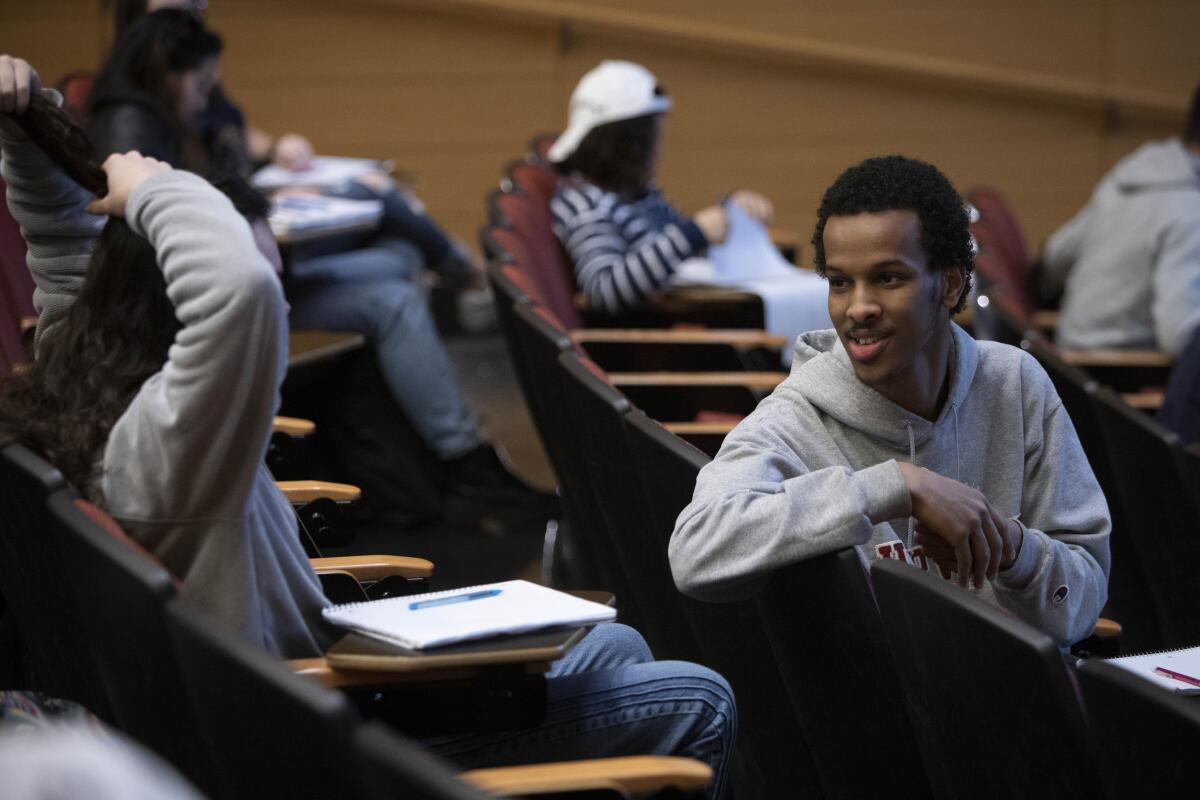
“I made it to the No. 1 public university in the world,” Mahmuod said, “but it took less than 10 minutes for me to feel I did not belong.”
That persistent feeling among many Black students at Berkeley — and years of demands for remedies — have led to what campus officials call their most concerted effort ever to improve diversity and combat anti-Blackness and other racism.
The effort, which includes changes to admissions, increased financial aid, expanded student support and new communal spaces, has been given greater urgency by the nationwide movement for racial justice triggered by the killing of George Floyd by a Minneapolis police officer in May.
The efforts are paying off. Last week, Berkeley announced it had accepted the largest number of Black students in three decades, accounting for 5% of the admitted California freshman class. The figure is close to mirroring the proportion of California high school graduates who are Black, 5.3%, but it’s too early to know how many students will actually enroll.
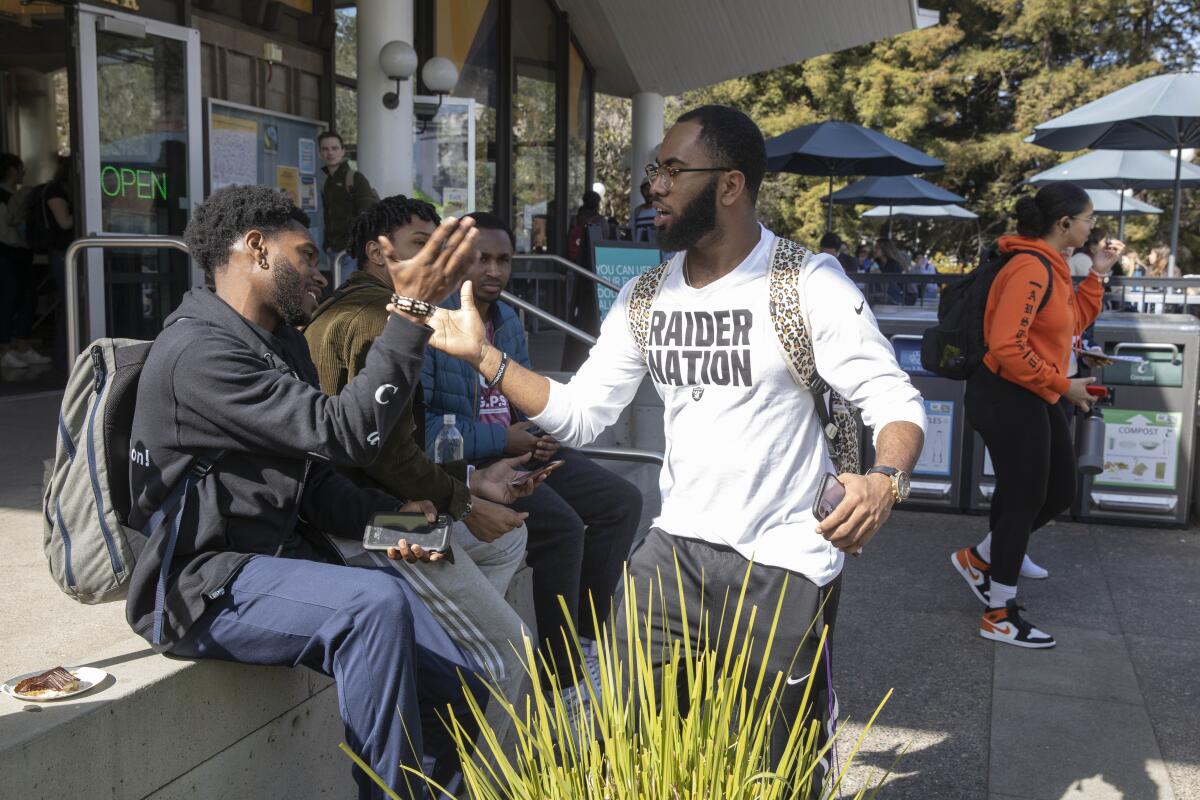
“The most important thing is creating a campus in which everybody feels that they belong, that they’re valued, that they’re respected and that they’re heard,” Chancellor Carol Christ said in an interview. “My commitment to that work is, today, stronger than ever given the state of race relations in our country and the moral imperative to provide justice, equity and opportunity for all.”
Berkeley’s problems started as the state’s Black share of residents began to decline in the 1990s and were exacerbated by the 1996 passage of Proposition 209, which banned affirmative action. Black student numbers plummeted from a high of 7.4% of all undergraduates in 1989 to a low of 3.2% in 2016. Berkeley now has the smallest percentage of Black students among UC’s nine undergraduate campuses except San Diego and Irvine.
Eddie Comeaux, a UC Riverside professor, attended Berkeley before the affirmative action ban and said the critical mass of Black students then gave him a sense of belonging.
“There were more opportunities to build community with people who look like you,” said Comeaux, who has studied Black student college choices. “When you don’t see that, it sends a signal that you’re not wanted.”
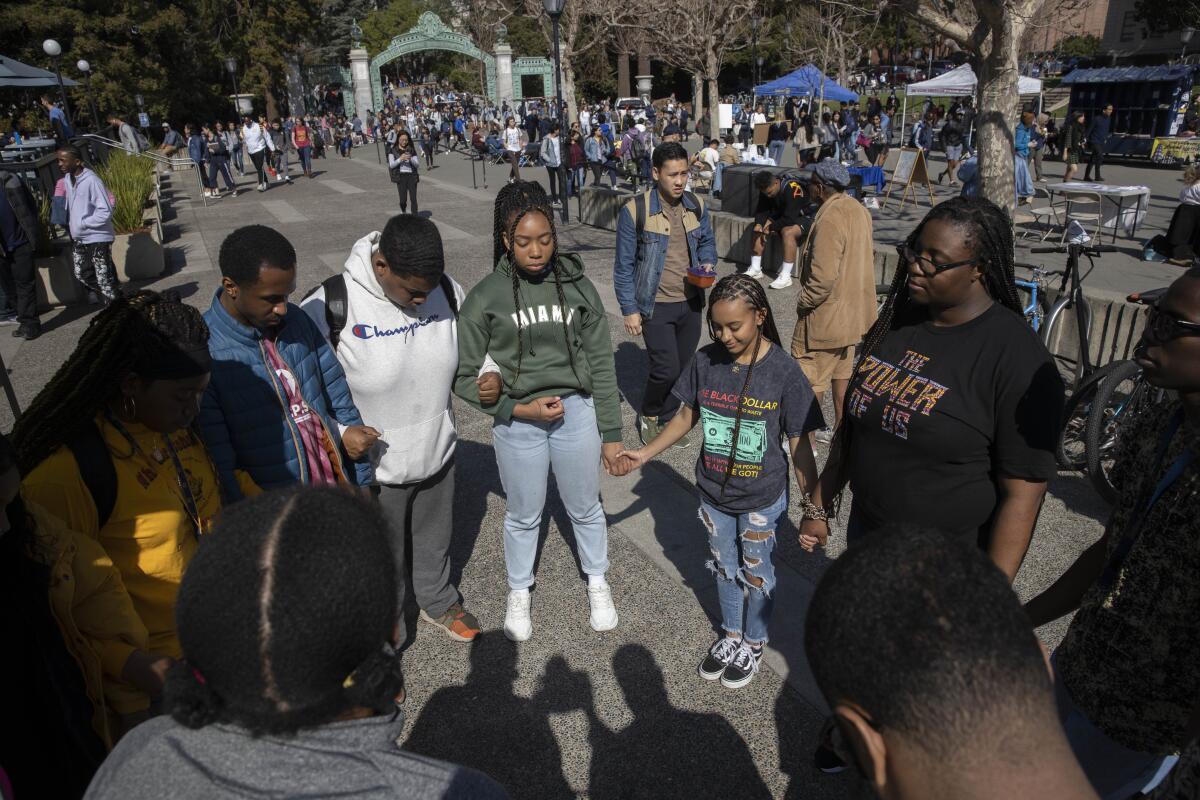
A 2019 study by the USC Race and Equity Center ranked Berkeley last among UC campuses in equity for Black students based on four factors. Berkeley scored an A for its Black student-faculty ratio, a B for gender diversity, a C for numerical representation and a D for its six-year Black student graduation rate of 75.4% — 15.9 percentage points lower than the campus’ overall student rate.
The USC study was largely based on 2016 data; Berkeley has since increased the number of Black students to 1,084 last fall, raised the graduation rate to 77.5% and added five Black full-time faculty members as of fall 2018.
Black Berkeley students have expressed dismay with their campus climate. In a 2018 UC undergraduate survey, 58% of Black respondents said they felt their race was disrespected, the highest proportion among UC campuses.
Those feelings were exacerbated in December, when a video went viral showing a UC Berkeley student using racial slurs against Black people, prompting a university review and statement of condemnation. Mahmuod and other Black students also complain about being racially profiled by campus police — being stopped for ID, for instance, more often than other students.
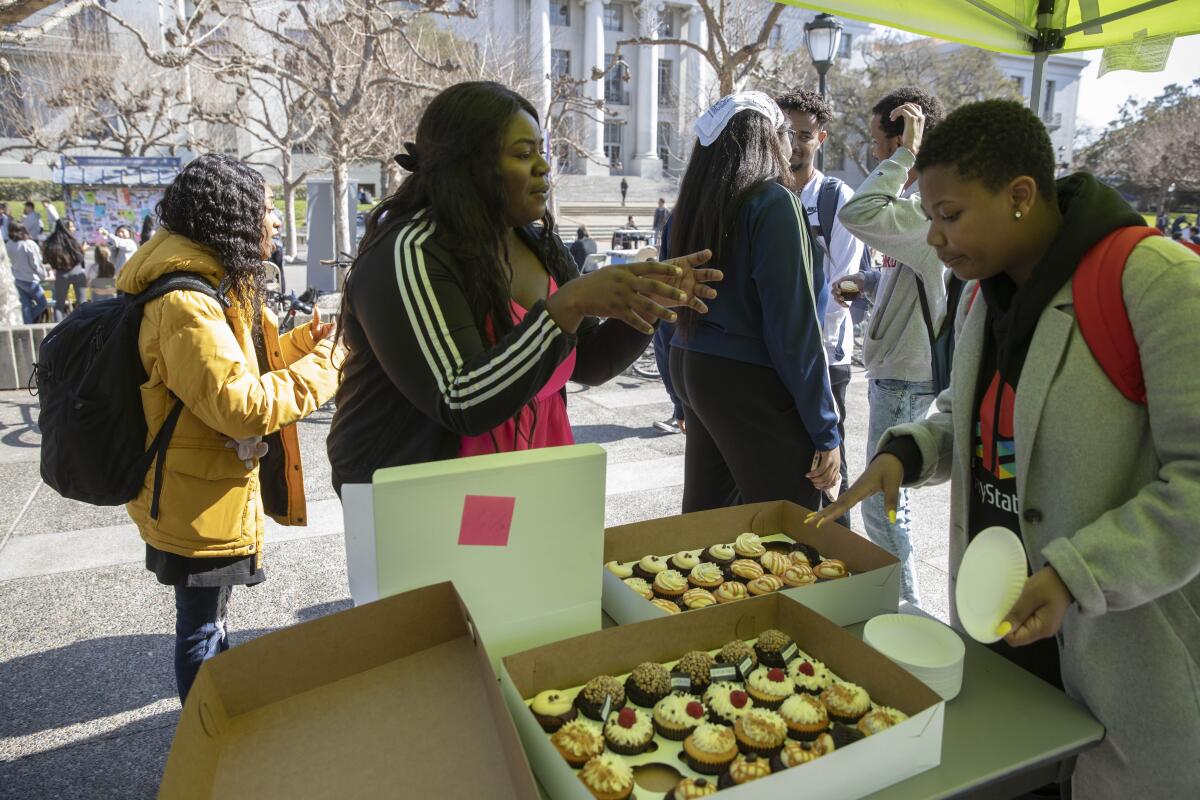
After years of Black student demands for change, Christ accelerated diversity efforts.
“If [students] don’t experience diversity in their classrooms, living spaces and extracurricular activities; if they don’t learn how to live and work in a diverse world, we’re really shortchanging them educationally,” she said.
To forge a new way forward, Berkeley hired Femi Ogundele away from Stanford University to serve as assistant vice chancellor and director of undergraduate admissions. He believes that enrolling more Black students will improve the negative campus environment for them.
“The only way that we’re going to be able to fight that narrative is to get into those communities and let them know that not only are you good enough but we are actively looking for you,” he said.
He and his team have “doubled down” on partnerships with Black community groups and high school counselors to widen the pipeline of potential applicants. They’ve expanded their recruiting efforts, both close to home in places such as Vallejo and Richmond and farther out, adding a recruiter in the mid-Atlantic region and a second one in Los Angeles.
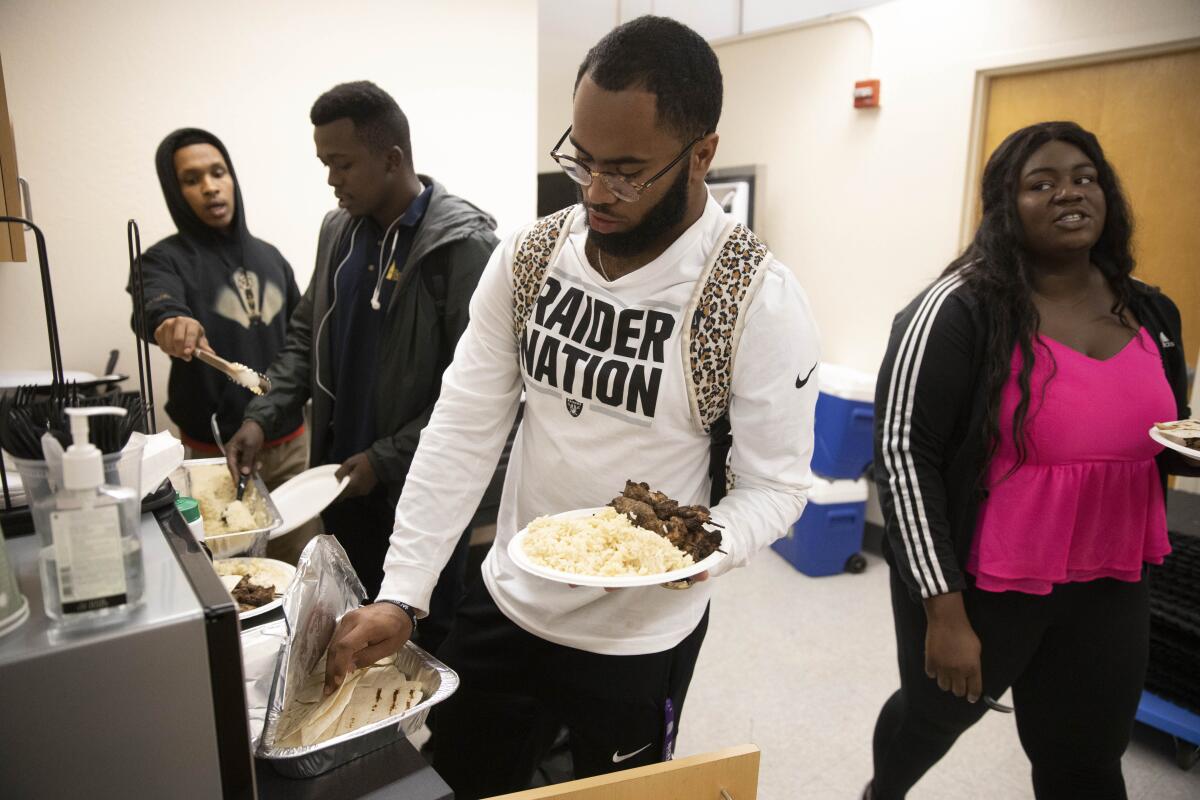
They’ve used social media to publicize Berkeley’s commitment to diversity, including an Instagram post last month by Black admission staff speaking out against racism and anti-Blackness. Berkeley also has begun to read applications differently to understand the context of a student’s background before evaluating their grades and test scores.
The student-led Black Recruitment and Retention Center has visited high schools, sponsored basketball camps and organized study jams, community barbecues, scholarships and networking opportunities.
“Even though we have a lot of issues here, it kind of motivates us to fight because I don’t think just giving up on this school is going to be beneficial for the Black students who are here,” said Nazak Wali-Ali, the center’s community development coordinator and a rising senior in legal studies and ethnic studies.
More generous financial aid has been a key recruiting tool. Berkeley launched a special scholarship program for Black students in 2018, raising private funds for it, and increased the $8,000 annual awards to 44 recipients this year compared with 12 last year.
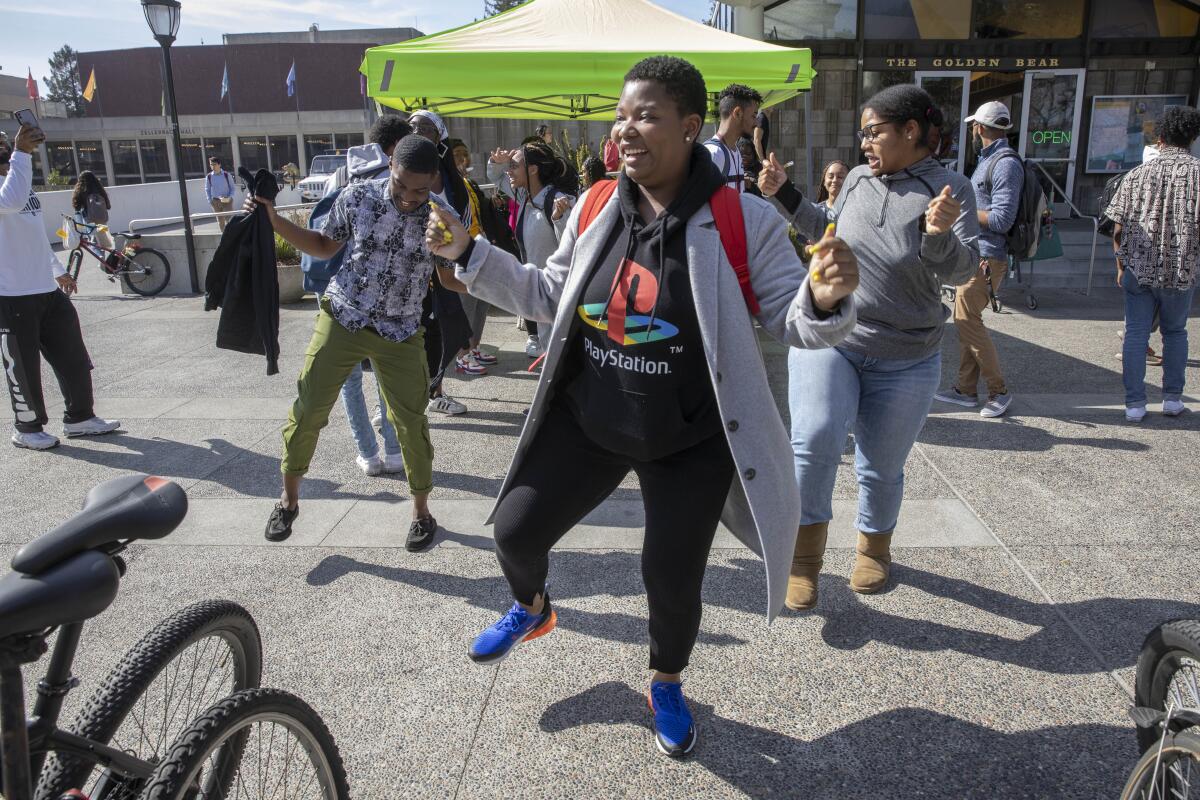
Such financial aid sealed the deal for students such as Nicole Anyanwu, a student senator and rising senior majoring in molecular biology.
Yet when she arrived, Anyanwu soon felt isolated, as the only Black student in many of her classes. When she walked through Sproul Plaza, which is typically lined with campus clubs trying to recruit members, she said no one offered her fliers — a common experience known as “Sprouling while Black.” When she did try to join a campus consulting club, Anyanwu said, she was told she wasn’t a good “cultural fit.”
Meanwhile, Black students have worked hard to create a sense of community among their limited numbers. They gather on Sproul Plaza each “Black Wednesday” to hang out and used demonstrations, including blockading the Golden Bear Cafe, to successfully lobby for a Black Resource Center.
The center, named after civil rights activist Fannie Lou Hamer, opened in 2017 and has become a sanctuary. Another gathering spot is the African American themed dorm.
The resource center features African art, a library and an altar dedicated to ancestors bearing flowers and inspiring messages. During a recent visit, students studied and socialized; some snacked on pupusas and built “vision boards” to set their intentions for the new decade.
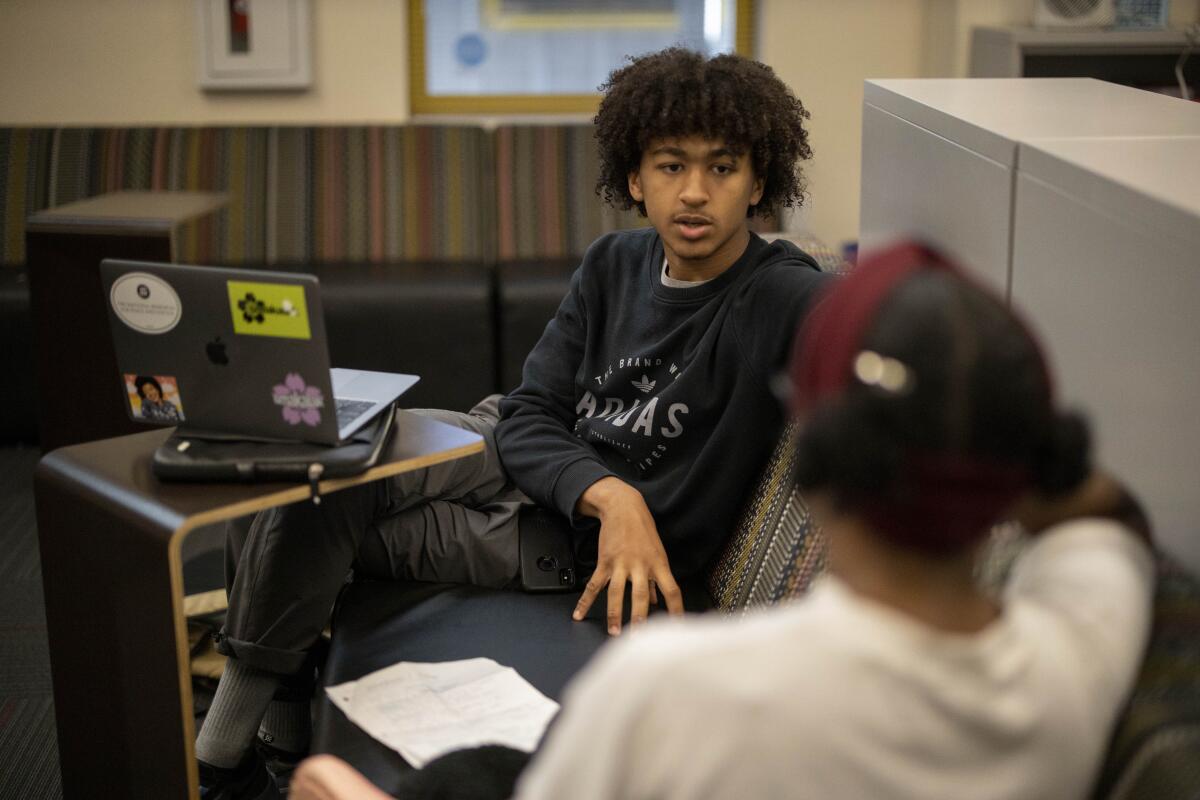
Jasmine Sozi, a rising senior majoring in ethnic studies, said the spaces and programming — on Black self-care, for instance — give her a sense of community. “Our experience at Berkeley would just like be completely different without the center,” Sozi said. “At a school where there’s maybe like 30,000 students, I maybe might see three Black people a day. So that’s one of the reasons I come to the center all of the time. I’m always able to see a friendly face here.”
In addition, the African American Student Development Office has added staff to provide academic guidance, social and emotional support, career development and community building. “Black joy” events, such as cultural food tastings, are also important to offset negativity and stress, Director Takiyah Jackson said.
Christ said, however, that much work remains. Campus officials are planning workshops to counter anti-Blackness and increased research opportunities for Black students. They also are working to hire more faculty of color, a major issue for many Black students.
Chezliah Osman, a rising fourth-year student in history, said she dropped out of her first-choice major, political science, because she found too many classes “incredibly Eurocentric and whitewashed.” In one course on wars, for instance, the professor said only European conflicts would be studied because of their technological advances. But last year, Berkeley hired assistant professor of political science Desmond Jagmohan, who has begun to teach a course on the History of African American Political Thought.
Raven Gatson, an incoming freshman from San Antonio, said she already senses change.
She was awarded an $8,000 scholarship and has been invited to a summer bridge program to ease her into Berkeley’s academic rigor. Several Black students and staff already have reached out to welcome her.
“If I as a Black female don’t go to Berkeley, it means one less Black person there,” she said. “Having a seat at the table is important.”
More to Read
Sign up for Essential California
The most important California stories and recommendations in your inbox every morning.
You may occasionally receive promotional content from the Los Angeles Times.











